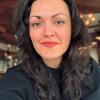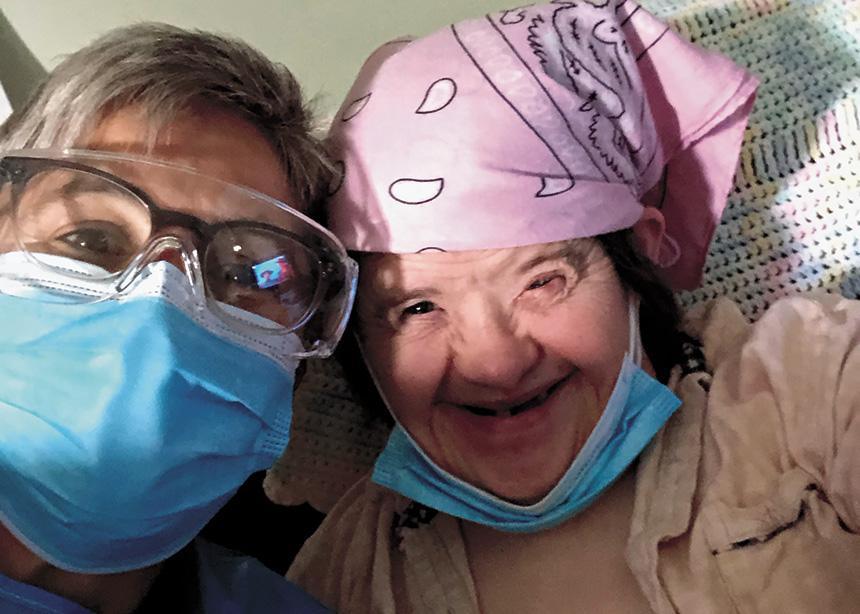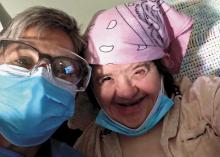Although Wendy Dunn had long felt a nudge to pursue theological studies, she never did so until COVID lockdowns at the care home where she worked as a nurse practitioner led her to provide spiritual care in ways she had never expected.
Dunn, 52, was born and raised in the Mennonite town of Poole near Milverton, Ont. In addition to serving as the designated piano player at Poole Mennonite Church, she works as a nurse practitioner at Greenwood Court, a care facility for seniors and people with disabilities in Stratford. Now she is also a student in the master of theological studies program at Conrad Grebel University College in Waterloo.
When Greenwood locked down after its first outbreak of COVID, Dunn and fellow staff hauled pianos into various positions throughout the facility where they had never been before. By this time, rules prohibited residents from leaving their rooms. Staff wanted to ensure the music would carry down the hallways and reach residents as they listened in their rooms.
Through the doors and walls, voices of seniors came through and accompanied Dunn as she played from the old red and blue Mennonite hymnals.
“It’s amazing what people with dementia will remember,” says Dunn. “Music is often the last thing to go.”
By November 2020, as reports indicated 62 percent of COVID deaths in Ontario were among residents of long-term care facilities, the Ontario government devised a plan to build what it called an “iron ring” around these homes. Families of residents could no longer visit, with only rare exceptions. The new rules also barred providers of spiritual care unless a resident was near death.
Dunn says that Greenwood faced staffing shortages even before the spread of COVID. “We were just getting by in terms of staffing and providing their care needs,” she says.
When workers and residents began to fall ill with the new virus, the facility lost about 30 percent of its staff. This figure included personal support workers, nurses and some administrators.
“All around, you just felt like you were abandoned,” says Dunn, who recruited people for roles left vacant, including her own children, who served as screeners.
Like other frontline staff in various health-care settings, Dunn found herself performing tasks that were otherwise outside her scope of care. With family members unable to visit, and a shortage of personal support workers, there were days when she fed residents and helped them use the washroom. On other days she helped with laundry.
Through the hard times, staff at Greenwood—which is operated by Tri-County Mennonite Homes—would often pray together.
After Chaplain Elaine Clark Siberry shared the following prayer during the first two weeks of the lockdown, it became became Dunn’s daily prayer: “Merciful God, open my heart and mind to be fully present to those I interact with throughout the day. Allow me to listen to others without passing judgment or haste to solve what I cannot change. Give me patience and understanding, and grant me grace in my shortcomings. Be with me in times of fatigue and lift me up with the strength to carry out your compassionate love to all those I meet. Amen.”
During outbreaks, Public Health Ontario required health care providers to swab residents and staff once every three days, if not daily. Dunn took charge of this task since her schedule permitted more flexibility than other nurses on the floors.
The prospect of having a 15-centimetre cotton swab inserted a couple centimetres up one nostril, and then waiting for results, made residents uneasy.
One day she arrived at a room shared by two women with dementia, one at a more progressed stage than the other, who had been crying and calling out in distress long enough to upset the other woman, who had no choice but to remain in the same room.
“I walked into the room and there was a lot of anxiety that couldn’t be controlled because nobody could leave that space,” Dunn says. “I just looked at her and said, ‘I can’t fix this. Do you want to pray together?’ She said ‘yes.’ It made me cry.”
The resident asked to pray for strength and patience. They both felt calmer after praying and were able to move on.
On another day during the lockdown, Dunn came to the aid of a resident as she lay dying from COVID. In accordance with the the wishes of the resident’s family, the facility allowed a Catholic priest to enter to perform the sacrament of the sick.
Too uncomfortable to enter the room, the priest remained in the doorway as he provided Dunn with instructions. As he read through the liturgy, he told her when to place the cross on the resident. Eventually, Dunn spread ashes on the resident’s forehead.
“It was very important for the family that that happened,” she says.
Through her years as a caregiver—she began nursing in 1994—Dunn has watched spirituality gain importance and emerge as a source of sustenance for those whose cognitive and physical bodies have begun to fail.
“I think I saw that in more of a real way with the pandemic,” she says.
So, in September 2022, she began to work part time toward a master of theological studies degree at Grebel while continuing her nursing work at the same time.
Thinking of the time she assisted the Catholic priest, she says she has most enjoyed learning the different ways in which people worship and adopting an openness to understanding what could be significant in certain rituals.
“I hope I can keep integrating that into my work because we do a lot of end-of-life work in palliative and long-term care.”




Add new comment
Canadian Mennonite invites comments and encourages constructive discussion about our content. Actual full names (first and last) are required. Comments are moderated and may be edited. They will not appear online until approved and will be posted during business hours. Some comments may be reproduced in print.